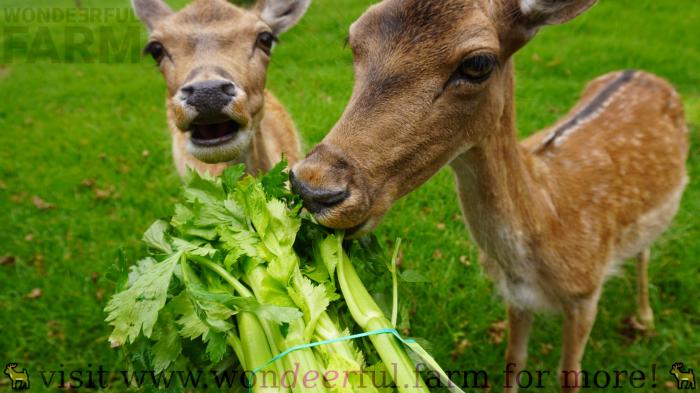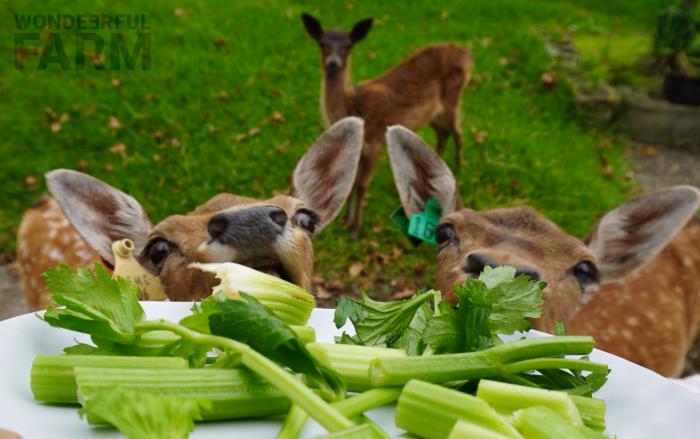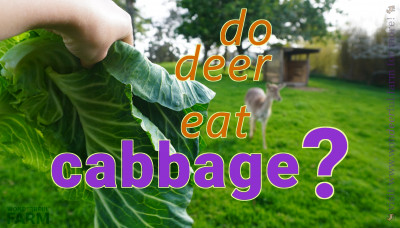Do Deer Eat Celery? (Farmer's Facts + Video)
» Deer stories » Do deer eat » Do Deer Eat Celery? (Farmer's Facts + Video)Plant type: biennials
Deer resistant: somewhat
Our plant hardiness zone:
New Zealand: subtropical
U.S. Zone 10b
If you're a gardener or just someone who loves feeding deer, you might be wondering if the deer in your area can eat celery - either your crop or your treat. In this article, we'll explore both aspects: are celery plants ok for deer to eat and how to protect your crop from these animals.
Do deer eat celery plants?
Actually, this one is a bit surprising, but yes, deer eat raw celery. Surprisingly so because it does have quite a strong aroma and deer are supposed to dislike aromatic plants. They frown upon mint and dill and basil but celery is apparently quite all right in deer culinary book.
- Do deer like celery leaves? Yes, deer like to eat celery leaves, in fact, they prefer leaves to stalks. They are attracted to the tender green foliage, which is high in water content and has a mild flavor that deer find appealing.
- Do deer eat celery stalks? Yes, deer will eat celery stalks if they are hungry enough. But due to celery stalks being tougher than the leaves they may not be as appealing to deer as other plants.
- Can deer eat celery plants down to the ground? Deer can demolish celery plants down to the ground if they are hungry enough. But more likely they will leave the tougher stalks behind and focus on the more tender leaves.
Is celery good for deer to eat?
Celery is healthy for deer to eat in moderation. Deer can benefit from eating celery as it is rich in water content that helps keep them hydrated. Additionally, celery is a good source of essential nutrients like vitamin C and potassium, which are important for deer's overall health and wellbeing.
In addition, celery contains antioxidants that can help protect deer from cell damage.
Nutritional content of celery, in table form, per 100 grams:
| Nutrient | Amount |
|---|---|
| Calories | 16 |
| Carbohydrates | 3.0 g |
| Protein | 0.7 g |
| Fat | 0.2 g |
| Fiber | 1.6 g |
| Vitamin A | 449 IU |
| Vitamin C | 3.1 mg |
| Vitamin K | 29.3 mcg |
| Folate | 36 mcg |
| Calcium | 40 mg |
| Iron | 0.2 mg |
| Magnesium | 11 mg |
| Potassium | 260 mg |
Should I feed wild deer celery
Many foods can be safely given to deer in small quantities, including celery. However, it's not just about whether a food is toxic or beneficial, but also about other factors like how well deer can digest it and the overall context. In moderation, deer can benefit from eating some celery, but it's important to avoid feeding them large amounts at once, especially in the winter when their digestive system is more sensitive. Sudden change of diet is dangerous for deer. To learn more about this topic, please refer to our post on considerations about deer feeding.
Best way to feed deer celery
Feeding celery to deer can be a fun and rewarding experience for nature lovers.
Here are some steps to follow to ensure both you and the deer have an enjoyable time:
- Choose a good spot where the deer feel safe and comfortable. A clearing in the woods or a park with plenty of vegetation for them to eat would be ideal. It's best to give them enough space to move around and avoid crowded areas.
- Get fresh raw celery from a local farmer's market or grocery store. Deer love this crunchy vegetable, but make sure it's fresh since they are used to eating their food straight from nature.
- Wash the celery thoroughly before giving it to the deer. This will remove any harmful pesticides or chemicals that may have been used in its cultivation.
- Cut the celery into small pieces that are easy for the deer to eat and spread them around nicely so many deer simultaneously can have access to food without fighting over a single pile.
Find a comfortable spot and wait patiently for the deer to approach. It's wise to keep a safe distance and avoid touching or petting them. Watching these animals enjoy their snack can be a memorable experience, but remember to always respect their space and natural behavior.
What other vegetables do deer eat?
Aside from raw celery, deer are known to eat a wide variety of vegetables, including but not limited to:
- Carrots Deer like to eat carrots because they are sweet and crunchy. Carrots are also high in fiber and vitamins, making them a nutritious snack for deer. Deer would probably enjoy the popular carrot and celery juice, come to think of it. :)
- Beetroot Deer will eat beetroot leaves and the root itself. Beetroot is high in fiber, vitamins, and minerals, making it a healthy snack for deer.
- Pumpkins Deer like to eat pumpkin leaves and the fruit itself. Pumpkins are high in fiber, vitamins, and minerals, making them a nutritious snack for deer.
- Cucumbers. Yep. Them too. Hydrating and nutritious.
What other animals like to eat celery?
In addition to deer, other animals that like to eat celery include rabbits, groundhogs, and squirrels. If you have these animals in your area, you may need to take additional steps to protect your celery crop.
How do I keep deer away from my celery?
Deer are notorious for eating anything in sight, including celery plants. Still, celery is not high on their list of preferred vegetables and is not a strong attractant for them. But if you want to prevent deer from eating your celery, it's best to take measures to keep them out of your yard altogether. Our post on protecting your garden from deer offers a lot of helpful tips.
The most effective way to keep deer away from your celery is to create a physical barrier around your garden using a sturdy material that won't entangle the deer and cause them harm. In our post, we also discuss other options such as repellents, hedges, dogs, and even coyote urine to deter deer from eating your plants. By taking proactive steps to protect your garden, you can enjoy your celery plants without worrying about them being devoured by deer.
Can Celery Regrow After Being Eaten by Deer?
Regrettably, once deer have damaged celery, it cannot regenerate. Celery is classified as a biennial plant, which implies that it has a two-year life cycle and can grow in various stages over two years, including greenery one year and flowers/seeds the next, provided the roots remain undisturbed.
However, in gardens, it is typically grown as an annual crop because only the leafy stalks are desired, not the flowers or seeds.
If deer have eaten a celery plant, it cannot regrow, and it is best to remove the base of the plant from the soil.
In conclusion, deer do eat celery plants, but they may prefer the leaves over the stalks. Celery is a nutritious vegetable for deer to eat in moderation, but there are other vegetables that they like as well. Celery is not a strong deer attractant, but if you want to be on the safe side and to protect your celery crop from deer, there are several ways to go about that, which we discuss in our dedicated article on keeping deer out of your garden.
Last modified 25 September 2023 at 23:52
Published 23 February 2023
Add your comment
Plants alphabetically
More «Do deer eat» stories
Do Deer Eat Bell Peppers?
Do deer typically enjoy capsicum plants and bell peppers themselves? Are sweet peppers deer resistant? How to keep deer away from capsicums?
read more...
Do Deer Eat Watermelon?
Will deer eat watermelon rinds? Do deer eat the whole plant of watermelon: vines and fruits? How to protect watermelon patch.
read more...
Do Deer Eat Cabbage?
This post addresses the questions of both gardeners and those keen on feeding their local deer. Do deer enjoy cabbage and is it healthy for them to eat. How to protect cabbage crops from deer in your garden.
read more...
 '
'




